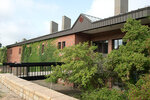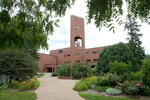The University of Wisconsin – River Falls is celebrating its sesquicentennial this year (in 2024), meaning that back in the 1970s, the centennial was the big event of the decade.
The …
This item is available in full to subscribers.
To continue reading, you will need to either log in, using the login form, below, or purchase a new subscription.
If you are a current print subscriber, you can set up a free website account and connect your subscription to it by clicking here.
Otherwise, click here to view your options for subscribing.
Please log in to continue |




The University of Wisconsin – River Falls is celebrating its sesquicentennial this year (in 2024), meaning that back in the 1970s, the centennial was the big event of the decade.
The decade was one of change for UWRF, according to the UWRF Archives and university website. But first, a little history.
The fourth State Normal School in Wisconsin, and the first in the northwestern part of the state, was founded in 1874. Many cities, including La Crosse, Hudson, Stevens Point, Grand Rapids, Menomonie, Eau Claire, New Lisbon and others, vied for the honor, but River Falls was selected. The first campus building was dedicated on Sept. 2, 1875.
When fire destroyed the original Normal School building in 1897, other communities again sought to have the school moved out of River Falls, but determination by the community kept it there. The building now known as South Hall saw completion in 1898.
When state universities and the University of Wisconsin merged in the fall of 1971, the university became known by its present name. Enrollment was 4,255 students. In 1972, the Kleinpell Fine Arts building was built, housing the College of Arts and Sciences, divisions of humanities and social sciences. The Walter H. Hunt Ice Arena followed in 1973, then the Centennial Science Hall in 1977.
As part of restoration efforts of the area surrounding the South Fork River, the establishment of an arboretum was proposed. Those pitching the idea lauded outdoor education, adding native plantings and beautification of campus as reasons. The estimated cost of 20-30 trees was $1,500.
In a 1972 River Falls Journal, the UWRF Centennial Planning Committee put out a plea for old yearbooks, old student newspaper files, archival papers and other materials. Chuck Brictson, the director of alumni and development, was the chairman, along with Dr. Walter Wyman, history professor; Dr. Marion Hawkins, English professor; Dr. Marvin Thompson, agriculture education professor; Vera Moss, professor emeritus of English; Dr. Wayne Wolfe, administrative vice president; and Louis Daniel of St. Paul, representing alumni.
The 1970s saw many notable speakers and entertainers visit UW-River Falls, including:
During the early span of Chancellor George Field’s administration, which spanned 1968-1985, student unrest gripped the campus. According to UWRF’s “History Through Leadership” article, “student activism centered on a number of issues, some of them national in scope, while others involved local campus policies. The changes brought about by this movement marked a dramatic difference between student life up to the 1960s and student life since then.”
Opposition to the Vietnam War reached its peak in 1970 when River Falls students voted at a mass meeting to strike for the remainder of the week in sympathy with Kent State students killed by Ohio state militia.
“At least 2,000 students attended the meeting. Picket lines were set up at entrances to buildings urging students to skip classes until the war was over. The strike began as the academic year came to a close and did not survive the long summer layoff. Students were back in classes in Fall 1970. Still, demonstrations and protest rallies continued through the election of 1972 and the end of the war.”
According to the article, students also fought in the 70s for the right to live off campus rather than in a residence hall, the right to free visitation in the halls, evaluation of faculty by students, equality for women students, the right to drop classes without penalties, student representation on disciplinary committees, and beer on campus. All these issues led to clashes with administration and in most cases victory for the student agitators.
The university fought its way through budget cuts and Field warned people to expect “hard times” in student services. The decade saw a veterinary school proposed that never came to fruition; the administration’s determination to demolish South Hall (but the building still stands); high bids for the Centennial Science Hall almost preventing its construction; and students making poor appearances at the polls.
The Centennial
According to the Sept. 26, 1974 River Falls Journal, the centennial celebration began with a grand fireworks show over the Melvin Wall Amphitheatre, kicking off a year of celebrating. The theme, “A Sense of the Future,” showed the university’s dedication to productive change.
The Stockholm Brass Quartet performed a concert of marches, waltzes and popular Swedish music at 8 p.m. Nov. 3 in the Kleinpell Fine Arts Building. The music was meant to underscore the contributions made by the many ethnic groups that settled in and around River Falls in the 1800s.
In a column published by professor Dr. Walker Wyman, he reminded students of the university’s motto, “The College where the Free Spirit Prevails.” And so it does to this day.